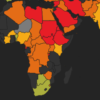According to a new global rights monitoring tool, almost 170 million people in the East and Horn of Africa live in countries where civic space is closed, meaning citizens face serious impediments to and sometimes-violent retribution for the full and free enjoyment of their civil and political rights.
The CIVICUS Monitor, launched today by CIVICUS, the global civil society alliance, in collaboration with DefendDefenders (the East and Horn of Africa Human Rights Defenders Project) rates countries based on how well they uphold the three fundamental rights that enable people to act collectively and make change: freedom of association, freedom of peaceful assembly, and freedom of expression.
As one of 20 global research partners, DefendDefenders uses its extensive network of regional focal points and grassroots human rights defenders to provide relevant information to the CIVICUS Monitor, creating an invaluable tool for human rights defenders, journalists, civil society organisations, academic institutions, and the general public to assess how well governments are enabling civic freedoms.
“We are witnessing a systematic narrowing of civic space in the East and Horn of Africa. All countries rated in the sub-region are categorised as closed, repressed or obstructed by the CIVICUS Monitor,” said Hassan Shire, Executive Director of DefendDefenders. “It is our hope that this online tool will give a new perspective on the human rights situation in the sub-region and will contribute to rapidly and effectively raising awareness of developments that affect our fundamental rights.”
The CIVICUS Monitor is the first-ever online tool to track and compare civic freedoms in real-time on a global scale, exploring the full potential to connect civil society worldwide through new digital possibilities. As part of this global network, DefendDefenders provides weekly updates to the CIVICUS Monitor to ensure that the data is accurate and up to date.
“In South Sudan, since fighting suddenly flared up in July, the situation for civil society has become extremely volatile. The crises in Ethiopia and Burundi have required constant attention as they evolve rapidly and often unpredictably,” added Mr. Shire. “The CIVICUS Monitor offers us a new opportunity to provide real-time information from local sources and place it in a international context.”
The platform also documents attacks on civil society, and CIVICUS’ analysis of more than 200 global updates over the past four months has found:
- Detention of activists (68 cases), use of excessive force against protesters (62 cases) and attacks on journalists (37 cases) were the three most common violations of civic freedoms;
- Activists were most likely to be detained over criticism of authorities (37%), human rights monitoring (29%) or political divisions or conflict (16%);
- Excessive force was most likely to be used against protesters who criticise government decisions or corruption (29%), call for action on human rights abuses (20%) or call for basic social or economic freedoms (20%);
- Journalists were most likely to be attacked covering protests (26%) or conflicts (19%), or because of their ethnicity, religious or political affiliation (14%);
- In the vast majority of cases, the state is the perpetrator of violations.
“Attacks on those who speak out against their leaders are becoming increasingly brazen – and it’s because governments know they can act with impunity,” said CIVICUS lead researcher Cathal Gilbert. “By collating these attacks, we hope the CIVICUS Monitor will serve as a wake-up call to the international community. We are inspired by the innovative ways that local civil society is resisting this assault, but it is imperative that global leaders do not stand by silently as their allies and trade partners crush domestic dissent.”
At launch the CIVICUS Monitor offers ratings of civic space in 104 countries and updates for most countries in the world. It finds that civic space in 16 countries – including Burundi, Eritrea, Ethiopia, South Sudan, and Sudan – is closed. A further 32 countries are rated repressed, 21 countries are rated obstructed and 26 narrowed. Just nine countries were rated as open, meaning the state safeguards space for civil society and provides platforms for dialogue. The number of countries rated will increase over time, with ratings for all countries available in 2017.

